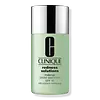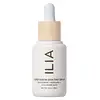Clinique Redness Solutions Makeup Broad Spectrum SPF 15 Foundation Versus Ilia Super Serum Skin Tint SPF 40
What's inside
What's inside
 Key Ingredients
Key Ingredients

 Benefits
Benefits

 Concerns
Concerns

 Ingredients Side-by-side
Ingredients Side-by-side

Ethylhexyl Methoxycinnamate 5.9%
UV AbsorberTitanium Dioxide 3.7%
Cosmetic ColorantZinc Oxide 2.9%
Cosmetic ColorantWater
Skin ConditioningMethyl Trimethicone
Skin ConditioningPhenyl Trimethicone
Skin ConditioningTriethylhexanoin
MaskingButylene Glycol
HumectantDimethicone
EmollientTrimethylsiloxysilicate
EmollientPEG-10 Dimethicone
Skin ConditioningLauryl PEG-9 Polydimethylsiloxyethyl Dimethicone
Skin ConditioningC12-15 Alkyl Benzoate
AntimicrobialLactobacillus Ferment
Skin ConditioningCitrus Grandis Peel Extract
AstringentMagnolia Grandiflora Bark Extract
AntimicrobialPoria Cocos Sclerotium Extract
AstringentAstrocaryum Murumuru Seed Butter
EmollientGlycerin
HumectantCaffeine
Skin ConditioningCaprylyl Methicone
Skin ConditioningStearic Acid
CleansingMethicone
EmollientPolyglyceryl-6 Polyricinoleate
EmulsifyingAcetyl Glucosamine
Skin ConditioningDisteardimonium Hectorite
StabilisingIsopropyl Titanium Triisostearate
EmollientDimethicone Crosspolymer-3
Skin ConditioningLecithin
EmollientTocopheryl Acetate
AntioxidantLaureth-7
EmulsifyingDimethicone/PEG-10/15 Crosspolymer
Sodium Chloride
MaskingDipropylene Glycol
HumectantDisodium EDTA
Aluminum Hydroxide
EmollientPhenoxyethanol
PreservativeMica
Cosmetic ColorantCI 77891
Cosmetic ColorantCI 77492
Cosmetic ColorantCI 77491
Cosmetic ColorantCI 77499
Cosmetic ColorantEthylhexyl Methoxycinnamate 5.9%, Titanium Dioxide 3.7%, Zinc Oxide 2.9%, Water, Methyl Trimethicone, Phenyl Trimethicone, Triethylhexanoin, Butylene Glycol, Dimethicone, Trimethylsiloxysilicate, PEG-10 Dimethicone, Lauryl PEG-9 Polydimethylsiloxyethyl Dimethicone, C12-15 Alkyl Benzoate, Lactobacillus Ferment, Citrus Grandis Peel Extract, Magnolia Grandiflora Bark Extract, Poria Cocos Sclerotium Extract, Astrocaryum Murumuru Seed Butter, Glycerin, Caffeine, Caprylyl Methicone, Stearic Acid, Methicone, Polyglyceryl-6 Polyricinoleate, Acetyl Glucosamine, Disteardimonium Hectorite, Isopropyl Titanium Triisostearate, Dimethicone Crosspolymer-3, Lecithin, Tocopheryl Acetate, Laureth-7, Dimethicone/PEG-10/15 Crosspolymer, Sodium Chloride, Dipropylene Glycol, Disodium EDTA, Aluminum Hydroxide, Phenoxyethanol, Mica, CI 77891, CI 77492, CI 77491, CI 77499
Zinc Oxide 12%
Cosmetic ColorantWater
Skin ConditioningSqualane
EmollientShea Butter Ethyl Esters
EmollientIsoamyl Laurate
EmollientPolyglyceryl-3 Ricinoleate
EmulsifyingButyloctyl Salicylate
Skin ConditioningPropanediol
SolventIsopropyl Isostearate
EmollientPolyglyceryl-3 Diisostearate
EmulsifyingMethylpropanediol
SolventNiacinamide
SmoothingSodium Chloride
MaskingLecithin
EmollientCaprylyl Glycol
EmollientSilica
AbrasiveAloe Barbadensis Leaf Juice Powder
Skin ConditioningBisabolol
MaskingHydrolyzed Sodium Hyaluronate
Skin ConditioningAllantoin
Skin ConditioningPhenylpropanol
MaskingSodium Myristoyl Glutamate
CleansingSodium Hyaluronate
HumectantTetrasodium Glutamate Diacetate
Aluminum Hydroxide
EmollientPolyhydroxystearic Acid
EmulsifyingCI 77491
Cosmetic ColorantCI 77492
Cosmetic ColorantCI 77499
Cosmetic ColorantCI 77891
Cosmetic ColorantZinc Oxide 12%, Water, Squalane, Shea Butter Ethyl Esters, Isoamyl Laurate, Polyglyceryl-3 Ricinoleate, Butyloctyl Salicylate, Propanediol, Isopropyl Isostearate, Polyglyceryl-3 Diisostearate, Methylpropanediol, Niacinamide, Sodium Chloride, Lecithin, Caprylyl Glycol, Silica, Aloe Barbadensis Leaf Juice Powder, Bisabolol, Hydrolyzed Sodium Hyaluronate, Allantoin, Phenylpropanol, Sodium Myristoyl Glutamate, Sodium Hyaluronate, Tetrasodium Glutamate Diacetate, Aluminum Hydroxide, Polyhydroxystearic Acid, CI 77491, CI 77492, CI 77499, CI 77891
 Reviews
Reviews

Ingredients Explained
These ingredients are found in both products.
Ingredients higher up in an ingredient list are typically present in a larger amount.
Aluminum Hydroxide is a form of aluminum. It can be naturally found in nature as the mineral gibbsite. In cosmetics, Aluminum Hydroxide is used as a colorant, pH adjuster, and absorbent.
As a colorant, Aluminum Hydroxide may add opacity, or reduce the transparency. Aluminum hydroxide is contains both basic and acidic properties.
According to manufacturers, this ingredient is an emollient and humectant. This means it helps hydrate the skin.
In medicine, this ingredient is used to help relieve heartburn and help heal ulcers.
There is currently no credible scientific evidence linking aluminum hydroxide in cosmetics to increased cancer risk.
Major health organizations allow the use of aluminum hydroxide in personal care products and have not flagged it as a carcinogenic risk at typical usage levels.
Learn more about Aluminum HydroxideCi 77491 is also hydrated iron III oxide. It's sole purpose is to give a red/pink hue to products.
Iron III oxides are classified as inorganic chemicals for coloring.
Synthetically created Ci 77491 is considered safer than those naturally found. This is because the synthetically created version may contain less impurities. Iron oxides are generally non-toxic and non-allergenic.
Learn more about CI 77491Ci 77492 is also hydrated iron III oxide. It's sole purpose is to give a yellow hue to products.
Iron III oxides are classified as inorganic chemicals for coloring.
Synthetically created Ci 77492 is considered safer than those naturally found. This is because the synthetically created version may contain less impurities. Iron oxides are generally non-toxic and non-allergenic.
Learn more about CI 77492Ci 77499 is also hydrated iron III oxide. It is created from mixing red and black iron oxides. This helps give shades of darkness to a product.
Iron III oxides are classified as inorganic chemicals for coloring.
Ci 77891 is a white pigment from Titanium dioxide. It is naturally found in minerals such as rutile and ilmenite.
It's main function is to add a white color to cosmetics. It can also be mixed with other colors to create different shades.
Ci 77891 is commonly found in sunscreens due to its ability to block UV rays.
Learn more about CI 77891Lecithin is a term for a group of substances found in the cell membranes of plants, animals, and humans. They are made up of mixture of phospholipids.
This ingredient has emollient and emulsifying properties.
As an emollient, lecithen helps soften the skin and creates a barrier to keep moisture in.
As an emulsifier, it also helps prevent water and oil ingredients from separating. Lecithin can also help ingredients be better absorbed by the skin.
This is because the phospholipids in lecithin produce liposomes. Liposomes help other ingredients get through the skin barrier.
Depending on the source of this ingredient, lecithin may not be fungal acne safe. This is because some sources of lecithin come from soybean oil, which may feed the malassezia yeast that feeds fungal acne.
We recommend reaching out to the brand you are purchasing from to inquire about the source of their lecithin.
Some other names for this ingredient include soy lecithin and deoiled soy lecithin.
Learn more about LecithinChances are, you eat sodium chloride every day. Sodium Chloride is also known as table salt.
This ingredient has many purposes in skincare: thickener, emulsifier, and exfoliator.
You'll most likely find this ingredient in cleansers where it is used to create a gel-like texture. As an emulsifier, it also prevents ingredients from separating.
There is much debate on whether this ingredient is comedogenic. The short answer - comedogenic ratings don't tell the whole story. Learn more about comegodenic ratings here.
The concensus about this ingredient causing acne seems to be divided. Research is needed to understand if this ingredient does cause acne.
Scrubs may use salt as the primary exfoliating ingredient.
Learn more about Sodium ChlorideWater. It's the most common cosmetic ingredient of all. You'll usually see it at the top of ingredient lists, meaning that it makes up the largest part of the product.
So why is it so popular? Water most often acts as a solvent - this means that it helps dissolve other ingredients into the formulation.
You'll also recognize water as that liquid we all need to stay alive. If you see this, drink a glass of water. Stay hydrated!
Learn more about WaterZinc Oxide is a mineral broad-spectrum UV filter; it is the broadest UVA and UVB reflector approved by the FDA. It also has skin protectant and skin soothing properties.
Zinc oxide is one of the most effective broad-spectrum UV filters. It protects against UVB, UVAII, and UVAI. In comparison to its counterpart titanium dioxide, zinc oxide provides uniform and extended UVA protection.
Another great benefit? This ingredient is highly photostable so it won't degrade easily under sunlight.
A common myth is that mineral UV filters are widely believed to primarily reflect UV light.
However, modern research shows titanium dioxide absorbs UV radiation like chemical filters (~95% absorption & 5% reflection).
Zinc oxide has great skin soothing properties so you'll likely find this in sunscreens formulated for sensitive skin or babies/children. It is unlikely to cause "eye sting" like other sunscreen ingredients.
Regulatory agencies consider zinc oxide to be non-toxic and safe. It has also been shown to not penetrate the skin.
Unfortunately, this ingredient does leave a visible white cast. This is why mineral sunscreens are often less cosmetically elegant than chemical or hybrid ones.
In cosmetics, zinc oxide can be found in both non-nano and nano-sized forms. The nano version is used to reduce white cast and improve the texture of sunscreen formulas.
There are ongoing concerns surrounding nano-zinc oxide's impact on marine ecosystems and whether it can be absorbed into skin.
Regarding marine ecosystems and coral reefs, there is no conclusive evidence that any form of zinc oxide (or any other sunscreen ingredients) will cause harm. The science is still developing but many consumers are keeping a close eye on this issue.
Please note, many destinations have reef-safety sunscreen rules. For instance, the U.S. Virgin Islands advises all visitors to use non-nano mineral sunscreens.
There has also been some stir about whether micronized or nano zinc oxide has potential photoxicity and absorption through the skin/lungs.
An in-vitro (done in a test tube or petri dish) study demonstrated micronized zinc oxide to have potential phototoxicity. There's no need to fret; the EU Commission's Scientific Committee on Consumer Safety has stated, "The relevance of these findings needs to be clarified by appropriate investigations in vivo." Or in other words, further studies done on living organisms are needed to prove this.
Current research shows zinc oxide nanoparticles do not penetrate intact or sunburned skin. They either remain on the surface or in the outermost layer of dead skin (stratum corneum).
Zinc oxide is one of only two classified mineral UV filters with titanium dioxide being the other one.
Fun fact: Zinc has been used throughout history as an ingredient in paint and medicine. An Indian text from 500BC is believed to list zinc oxide as a salve for open wound. The Ancient Greek physician Dioscorides has also mentioned the use of zinc as an ointment in 1AD.
Learn more about Zinc Oxide